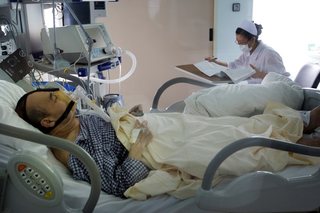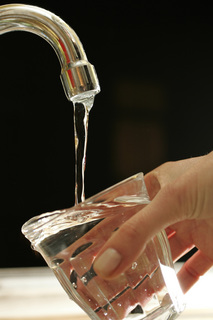Since 1993, the EU has provided the republic with 153 million euros (US $182 million) worth of humanitarian aid.
Published:
16 February 2005 y., Wednesday
Made up of an ethnic mix of Tajiks, Uzbeks and Russians, in 2004 Tajikistan experienced a further relative improvement in its overall humanitarian situation. International donor support remained strong - reaffirmed at a conference in London in February - but with a noticeable change of emphasis towards greater long-term development assistance to the mountainous nation and less on humanitarian aid.
Mirroring this trend, in May, the Humanitarian Aid Office of the European Commission (ECHO) reaffirmed its plans to scale back humanitarian activities in Tajikistan over the next three years. Since 1993, the EU has provided the republic with 153 million euros (US $182 million) worth of humanitarian aid.
But huge needs remain. Poverty has driven approximately 1 million Tajiks to seek better fortunes abroad, primarily in Russia. Over 83 percent of the population live below the national poverty line. A full 17 percent of the country's 6.3 million population is considered destitute. Food insecurity - particularly in rural areas - remains a key humanitarian issue.The education and healthcare systems continue to deteriorate, worsening the prospects for current and future generations.
The UN World Food Programme (WFP) continued to assist Tajikistan under its Protected Relief and Recovery Operation (PRRO), marking a transition from humanitarian relief to recovery and development in the country. "Tajikistan is a low-income and food-deficit country needing food assistance," the WFP country director, Ardag Meghdessian, told IRIN. "The shift of emphasis from relief to recovery indeed indicates increased stability in the country, as well as an improvement of the overall humanitarian situation," he said, adding that the devastating two-year drought in 2000 and 2001 was over.
Šaltinis:
irinnews.org
Copying, publishing, announcing any information from the News.lt portal without written permission of News.lt editorial office is prohibited.
The most popular articles
 51-year-old mother of eight, sits beside her sick husband, Tuy Muy, 52, in Battambang Provincial Referral Hospital. He is lying on a bed with a stomach problem, battling nausea and vomiting.
more »
51-year-old mother of eight, sits beside her sick husband, Tuy Muy, 52, in Battambang Provincial Referral Hospital. He is lying on a bed with a stomach problem, battling nausea and vomiting.
more »
 The length of maternity and paternity leave are at the heart of a crucial vote in the plenary sitting of March 24-25.
more »
The length of maternity and paternity leave are at the heart of a crucial vote in the plenary sitting of March 24-25.
more »
 The perception women have of the EU, the way the economic and financial crisis is affecting women and the lessons to be learnt ahead of the 2014 elections are among the issues to be tackled during a colloquium being held at the European Parliament on Tuesday.
more »
The perception women have of the EU, the way the economic and financial crisis is affecting women and the lessons to be learnt ahead of the 2014 elections are among the issues to be tackled during a colloquium being held at the European Parliament on Tuesday.
more »
 To achieve quicker de facto gender equality, Commission and Member States should adopt and implement specific gender equality policies, Parliament said in a resolution adopted on Thursday.
more »
To achieve quicker de facto gender equality, Commission and Member States should adopt and implement specific gender equality policies, Parliament said in a resolution adopted on Thursday.
more »
 Are you thinking about setting up your own business or are you already a successful entrepreneur? The Erasmus for Young Entrepreneurs exchange scheme offers an excellent opportunity for new entrepreneurs to acquire relevant skills for managing a small or medium-sized enterprise (SME).
more »
Are you thinking about setting up your own business or are you already a successful entrepreneur? The Erasmus for Young Entrepreneurs exchange scheme offers an excellent opportunity for new entrepreneurs to acquire relevant skills for managing a small or medium-sized enterprise (SME).
more »
 The pain of divorce and separation is all too often accompanied by financial and emotional hardship when one parent lives abroad and refuses to provide financial help.
more »
The pain of divorce and separation is all too often accompanied by financial and emotional hardship when one parent lives abroad and refuses to provide financial help.
more »
 Most Europeans still do not know they can call 112 anywhere in the EU to contact the police, fire brigade or an ambulance.
more »
Most Europeans still do not know they can call 112 anywhere in the EU to contact the police, fire brigade or an ambulance.
more »
 Helping to meet Haiti's humanitarian, reconstruction and nation-building needs must be the EU's priority in tackling the earthquake's aftermath, says Parliament in a resolution approved on Wednesday.
more »
Helping to meet Haiti's humanitarian, reconstruction and nation-building needs must be the EU's priority in tackling the earthquake's aftermath, says Parliament in a resolution approved on Wednesday.
more »
 Further work is needed to continue improving access to safe drinking-water at home, sewerage systems and safe bathing water throughout the European Region.
more »
Further work is needed to continue improving access to safe drinking-water at home, sewerage systems and safe bathing water throughout the European Region.
more »
 Poor housing remains a blight across Europe and Tuesday evening MEPs will debate a plan to extend EU funding to help renovate and repair housing stock for the poorest people on the continent.
more »
Poor housing remains a blight across Europe and Tuesday evening MEPs will debate a plan to extend EU funding to help renovate and repair housing stock for the poorest people on the continent.
more »